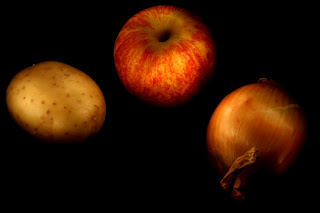Exposure bracketing, that's another thing to learn in order to better understand how photography works.
Well it ain't that complicated as it sounds. It's exactly what it says on the tin. You bracket the exposure that camera thinks is correct with two more exposures, one underexposed (darker image) and one overexposed (lighter image).
So, how that works and what it's for? Let's say you are about to take a picture of a complicated scene, such as a sunset on a seaside. In this case it's complicated because the sun is so bright, that it can easily confuse the camera meter. The meter will think: wow, that's bright, I'll have to expose it "correctly". And more often the image will come out underexposed, not exactly what you would expect. Now, what you do is you bracket your exposures. This setting, when turned on, will set the camera to shoot three differently exposed frames, one underexposed, one normally exposed and one overexposed. You will have to push the shutter release button three times to get your three frames. Question: how different the exposures will be? This is up to you. When you set the exposure bracketing you set the values your self. This is measured in stops, you can set 1/3 of a stop in most modern cameras too. So, in the case of the sunset we will bracket by at least one stop, even two would turn out better. Then you can choose the best exposure.
In the old, film days, this was a popular technique to ensure a good exposure, especially when using filters. In the case of the sunset there could be done more then one bracketing with different settings to get just one picture. That's because you couldn't see what you're getting until the film is processed. But now we have digital cameras and we can check the exposure on the spot and then adjust it as necessary. But that doesn't mean that bracketing is unnecessary, the small (compared to a computer monitor) camera display isn't the best way to judge the exposure, so you can bracket as many as you need and check on your computer, and choose. And it won't cost you a dime.
24.10.07
Exposure bracketing in photography
Author
Sheriff
at:
20:38
![]()
Lables: Introduction
Subscribe to:
Post Comments (Atom)

1 comment:
Hello my Irish friend, very good on the blog, well explained. It is always nice to see someone with a passion, and also to remind other of the finer points on camera techniques we tend to ignore sometimes. Greg Kiwi lad in Dublin
Post a Comment